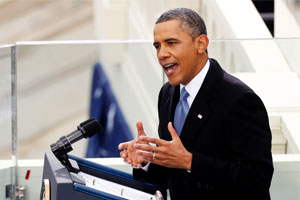U.S. President Barack Obama Urged To Push For Economic Reforms in India

Washington: Ahead of a crucial Indo-U.S. Strategic Dialogue in New Delhi next month, U.S. President Barack Obama has been encouraged to push for economic reforms in India and to address the concerns of the Indian companies with regard to H-1B visas.
"The U.S. and India have accomplished much in recent years, but we need a strong push to restore confidence that India is investment- and trade-friendly and open to a collaborative economic relationship with the United States," Ajay Banga, chairman of the U.S. India Business Council (USIBC) and president and CEO of MasterCard Worldwide, said in a letter to Obama.
"We hope that in the upcoming meetings with your Indian counterparts you and your administration will drive home the importance of addressing the key Indian practices at issue and assure them that this country is prepared to be India's full partner provided that India does its share," Banga said in his letter dated May 23.
The Secretary of State, John Kerry, is scheduled to travel to India next month for the next round of India-U.S. Strategic Dialogue. Moreover, Obama has invited the Indian Prime Minister Manmohan Singh for a meeting at the White House later this year.
The exact dates of both the meetings have not been announced, but the two crucial meetings are expected to set the pace and scope for the much needed push to India U.S. relationship in the second term of the Obama administration.
"We ask that you and your representatives lay before our Indian friends an agenda of key changes in Indian policy which, if undertaken, will go a long way towards improving the business climate and restoring confidence in the Indian economy," Banga said.
Observing that these high level meetings are coming at an important time in political calendar as India heads to general elections next year, he said, much needs to be done before the polls to strengthen the relationship, especially the economic and commercial aspects of it.
"This agenda should include a hard look at Indian tax policy, aspects of which haunt investors. It should also address intellectual property policy, especially as it affects the pharmaceutical industry. It must treat the serious challenge to American electronics and IT service firms and manufacturers from India's new preferential market access policy which, bluntly stated, discriminates against foreign competition," Banga said.
In his letter to Obama, a copy of which has also been sent to the Secretary of State, Banga strongly takes up the case of Indian IT companies with regard to H-1B visas.
Banga said that the United States should recognize that Indian investment in the U.S., now at $11 billion and growing, is a force for the good, creating thousands of American jobs and facilitating technology transfer.
"As our economy returns to full strength, it will be spurred by innovative applications of information technology.
The United States will not be able to meet demand for information technology and software solutions without support from temporary additions to our skilled work force. India is a significant exporter of this talent," he argued.
"As immigration reform is pursued, it is in our interests to not only open doors to larger numbers of skilled personnel, but to be certain immigration reform does not discriminate against our friends in India and limit American companies' choice as to where they source the support needed by them in the field of IT," Banga said.
Noting that it would be wrong to impose conditions on the recruitment and deployment of such tech-savvy workers which current drafts of legislation foresee, Banga said the U.S. must stand for principles of free trade - including the free movement of technical professionals - if the country is to compete internationally, including in India.
"An Indian middle- class, now surpassing 300 million with a purchasing power of greater than $30,000 per year per person, represents a huge market opportunity for American exporters and investors," Banga wrote in his three page letter.
"But we will not achieve this promise unless India resumes its growth, restores momentum to its economic reform programs and corrects serious flaws in regulation and policy which damage the prospects of India and foreign corporations alike," he said.
Banga said the agenda of talks should include India's passage of critically needed legislation which will attract capital to India by opening sectors like insurance to greater foreign investment.
"India's archaic laws in the field of land acquisition require legislative redress. Resolving issues relating to the retail opening will inspire fresh interest in India and spur investment in India's rural agricultural sector," he said.
"India's government has still to create conditions which will permit U.S. investors in the nuclear industry to enter India's market," Banga wrote adding that no businessperson, Indian or American, would question India's need for massive investments in its infrastructure.
Also Read:
Learn To Renew Your Public Provident Fund Account
Want To Know Richest Indian's Salary?


.jpg)
